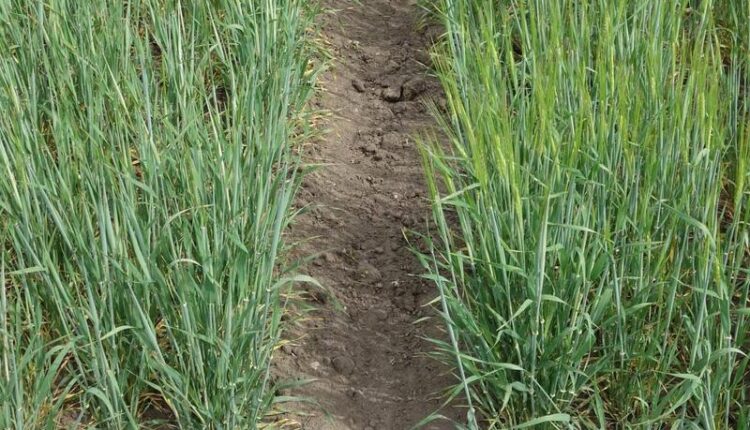Adapting to climate change

On the right, plants with the special gene variant are growing - ears of barley are already visible. On the left, plants at a slower pace and their ears are not visible yet.
(c) Uni Halle / Tanja Zahn
Researchers find natural gene variant that allows barley to flower earlier.
A tiny mutation in the genetic material of barley ensures that those plants develop faster and thus flower earlier than established barley varieties. At the same time, plant yields remain the same, a team from Martin Luther University Halle-Wittenberg (MLU) reports in the “Journal of Experimental Botany”. According to the researchers, this is advantageous as the plants could potentially adapt better to the effects of climate change and continue to produce stable harvests.
Plants have adapted their development to their surroundings over the course of several million years. However, global warming is happening at a much faster rate, so plants have little time to adapt to the new conditions. “The genetic diversity of current barley varieties is limited, which means they can only moderately adapt to changing environmental conditions in the course of climate change,” explains the leader of the study, Dr Andreas Maurer from the Institute of Agricultural and Food Sciences at MLU. This prompted the researchers to look for ways to better adapt crops to these new conditions in the future.
They found what they were looking for in the EARLY FLOWERING3 (ELF3) gene, which was already known to play an important role in plant development. ELF3 is an essential component of a plant’s so-called circadian clock. This is a whole network of genes and proteins that control various processes in plants so they can, for example, react to the day-night rhythm and the seasons.
As part of extensive field trials and greenhouse experiments, the team investigated different natural variants of the ELF3 gene in almost genetically identical plants by crossing an established barley variety (Barke) with various wild barleys. The researchers discovered a variant with special properties. Even though its genetic code differed only at a single point compared to the established ELF3 variant, the plants developed significantly faster. Compared to plants carrying the established ELF3 variant, these plants flowered up to 18 days earlier in the greenhouse trial and up to four days earlier in field experiments. Depending on the weather, even those four days can greatly impact yields, as the plant can complete important stages of its development before possible harmful events happen. “Crossing with natural variants of wild barley is often accompanied by yield losses. Remarkably, this wasn’t the case in our study,” adds Maurer. The barley with the special natural ELF3 variant produced comparable yields.
The findings of the study could help to create new, climate-resilient barley. “By crossing with the natural variant, we found that barley could flower before a dry period sets in and thus deliver a higher yield than later-flowering varieties. Such adaptations are necessary in order to secure the world’s food supply in the face of global warming,” says agricultural and food scientist Tanja Zahn, who is pursuing her PhD at MLU.
The study was funded by the European Social Fund and the European Regional Development Fund as well as by the Federal Ministry of Education and Research and the German Research Foundation.
Originalpublikation:
Study: Zahn T. et al. Novel exotic alleles of EARLY FLOWERING 3 determine plant development in barley. Journal of Experimental Botany (2023). doi: 10.1093/jxb/erad127
https://academic.oup.com/jxb/advance-article/doi/10.1093/jxb/erad127/7100059
Media Contact
All latest news from the category: Agricultural and Forestry Science
Newest articles

Innovative 3D printed scaffolds offer new hope for bone healing
Researchers at the Institute for Bioengineering of Catalonia have developed novel 3D printed PLA-CaP scaffolds that promote blood vessel formation, ensuring better healing and regeneration of bone tissue. Bone is…

The surprising role of gut infection in Alzheimer’s disease
ASU- and Banner Alzheimer’s Institute-led study implicates link between a common virus and the disease, which travels from the gut to the brain and may be a target for antiviral…

Molecular gardening: New enzymes discovered for protein modification pruning
How deubiquitinases USP53 and USP54 cleave long polyubiquitin chains and how the former is linked to liver disease in children. Deubiquitinases (DUBs) are enzymes used by cells to trim protein…



